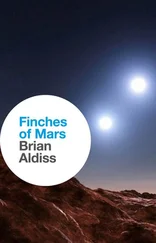Brian Aldiss - White Mars
Здесь есть возможность читать онлайн «Brian Aldiss - White Mars» весь текст электронной книги совершенно бесплатно (целиком полную версию без сокращений). В некоторых случаях можно слушать аудио, скачать через торрент в формате fb2 и присутствует краткое содержание. Год выпуска: 1999, ISBN: 1999, Издательство: Little, Brown UK, Жанр: Фантастика и фэнтези, на английском языке. Описание произведения, (предисловие) а так же отзывы посетителей доступны на портале библиотеки ЛибКат.
- Название:White Mars
- Автор:
- Издательство:Little, Brown UK
- Жанр:
- Год:1999
- ISBN:0-316-85243-0
- Рейтинг книги:5 / 5. Голосов: 1
-
Избранное:Добавить в избранное
- Отзывы:
-
Ваша оценка:
- 100
- 1
- 2
- 3
- 4
- 5
White Mars: краткое содержание, описание и аннотация
Предлагаем к чтению аннотацию, описание, краткое содержание или предисловие (зависит от того, что написал сам автор книги «White Mars»). Если вы не нашли необходимую информацию о книге — напишите в комментариях, мы постараемся отыскать её.
White Mars — читать онлайн бесплатно полную книгу (весь текст) целиком
Ниже представлен текст книги, разбитый по страницам. Система сохранения места последней прочитанной страницы, позволяет с удобством читать онлайн бесплатно книгу «White Mars», без необходимости каждый раз заново искать на чём Вы остановились. Поставьте закладку, и сможете в любой момент перейти на страницу, на которой закончили чтение.
Интервал:
Закладка:
To remind us of its size, he zapped before the audience a 3D vidslide showing Olympus in profile, with a dawn light on its higher reaches, while its tall serrated skirts remained in a dusky red twilight. Its vast span covered 600 kilometres of ground.
“There it is, waiting for we know not what, amid ancient cratered topography over three billion years old.”
A shot of Earth’s Mount Everest was superimposed over Olympus. It showed as the merest pimple below the central caldera.
“As you see,” said Dreiser, “Olympus is unusually large for a volcano. For a life form it defies the imagination.”
An uneasy hush fell on the audience.
I remarked that Mars had previously been ruled out as an abode of life.
But this, Dreiser argued, was merely a reference to the many studies that had been conducted of soil and rock samples, of the analysis of the atmosphere, and of drillings made down into the crust. None had revealed any evidence for Martian life of any kind—even when allowances were made for the fact that life here might be completely different from life on Earth.
It was still difficult, I said, not to think of Olympus as simply an extraordinarily large volcano among other Martian volcanoes, admittedly of smaller size, such as Elysium, Arsia and Pavonis. Or were they also the carapaces of living beings?
He thought not. “Reproduction is a basic evolutionary function. Nevertheless it seems that Olympus has not spawned. Maybe it is a hermaphrodite. Maybe it simply lacks a partner.”
We would come to what it resembled later, Dreiser said. He wished to state that he had no quarrel with all the previous research centering on the quest for life. Those conclusions were definitive. Olympus was unique.
At this juncture, Dreiser said, he believed that the spotlight should shine on his associate, who had first brought the movements of Olympus to scientific notice. Those movements were so unprecedented that at first they were not credited. In introducing Kathi Skadmorr, he knew she was already celebrated as the YEA who had courageously gone down into the throat of the Valles Marineris and found considerable underground reservoirs of water.
Kathi now came to the dais and spoke without preamble, almost before the clapping had finished. “I’m campaigning to call Olympus Mons by a more vital name. It was christened in ignorance, long ago. I propose rechristening it, in the light of our new-found knowledge, Chimborazo, which means the ‘Watchtower of the Universe’. So far my campaign has only one member, but I’m still hoping.
“We don’t as yet know what we have here. Okay, Chimborazo moves, but whole mountains have been known to move. So movement does not necessarily mean life. Here’s where we detected movement.”
She zapped a vidslide taken from the satcam, showing the tumbled regolith on Chimborazo’s westerly side, and continued to speak.
“The broken regolith shows where our friend upped stumps and began to move. We secured one of those elusive white tongues you will all have seen. They are in fact inorganic, but with organic nerves and feelers lacing them. It seems not all tongues are identical, and that they serve different functions.
“Our hypothesis at present is that the tongues, more scientifically termed exteroceptors and proprioceptors, were once digestive organs, and that they have been modified over the eons. Not only do they provide nourishment to Chimborazo: they also function as rudimentary detectors. Thus, you see, they provide evidence that Chimborazo is not only a massive life form: it is also a life form with some kind of intelligence.
“Now I will hand over to Tom and Dreiser again.” She did not leave the dais, but took a seat next to me.
After thanking Kathi, I asked Dreiser where this monstrous thing had come from? From outer space? The Oort Cloud?
Not at all. “Olympus Mons,” said Dreiser, then hesitated. “Very well then, Chimboranzo—”
Kathi immediately interrupted, saying, “It’s Chimborazo, Dreiser!”
He gave a grunt and grinned at her. “Chimborazo is entirely indigenous. Nor is there anything uncanny about it. Our belief is that it is the result of a curious form of evolution—curious, that is, from the point of view of one accustomed to thinking in terrestrial terms. Curious—but by no means irrational.”
But if this life form actually evolved on Mars, as Dreiser claimed, there would surely be evidence of other life in the atmosphere, I said. Not only in the atmosphere, but in the rocks and regolith. “Evolution’, after all, implied “natural selection’, so there must have been other forms of life with which this monstrous Olympus organism had been in competition. I remarked that it would be silly to turn our backs on Darwin’s findings, since natural selection was now a well-established principle.
Dreiser had adopted a slouching posture, as if scarcely interested in the topic we were discussing. Now he sat up and looked at me with a direct stare.
“I am not disputing those principles, Tom. Far from it. But it is all too easy to fall into the way of thinking that how natural selection has operated in the main on Earth is its only method. Conditions here are vastly different from those Downstairs. Which is not to say that Darwin’s perceptions do not still apply.”
Of course conditions differed, I agreed. But I could not see how his Olympus could have extinguished all other life forms on the planet, simply by sitting there like a great lump, all in one place.
“For some while we thought exactly as you do. I have to say it is a limited point of view. Mounting evidence that Olympus is a living thing has made us change our opinions, our rather parochial earthly opinions. In fact, evolution on Earth itself has not been entirely ‘Nature red in tooth and claw’. I could name many examples of cooperation between species that have led to vital evolutionary advantage. I stress that: cooperation, not competition.”
I supposed he was thinking of man and his long relationship with the dog.
“Unfortunately we did not bring our loyal friend the dog here with us, more’s the pity. We will certainly need him when we travel towards the stars to face unforeseen challenges. We did bring all the bacteria in our stomachs, without which we could not survive. That’s a handy example of a symbiotic relationship.”
What could that have to do, I asked, with his Olympian organism wiping out the rest of Martian life?
“That is not my argument. Not at all. There are many examples where symbiosis has played a vital role in evolution. Let’s take lichens. Two differing organisms got together, a fungus and an alga, to form the unbeatable lichen, the hardiest of terrestrial life forms. Lichens are the first to move in after a volcanic eruption has wiped a mountainside clean. Even we, resourceful humankind, depend on our bacteria, just as swarming microlife depends on us.”
We had found no lichen-like organisms on Mars, I argued, and asked where that left us.
“Hang on. I’m not finished. I have some even more apposite examples of cooperation. There were times in the evolution of life on Earth when symbiotic relations have been absolutely vital.
“Take the eukaryotic cell. This is the kind of cell of which all ordinary plants and all animals are composed. It’s a cell that contains a distinct nucleus within which chromosomes carry genetic material. It has long been established that the first eukaryotic cells came about by the union of two other more primitive types of organism, the earlier prokaryotic cell and a kind of spirochete. The development of all multicellular plants and animals—and humans—stems from this union.
“Incidentally, on the subject of life, you might ask yourself how likely—what are the odds—of such a coincidence happening elsewhere in our galaxy. Long odds, I’d say.”
Читать дальшеИнтервал:
Закладка:
Похожие книги на «White Mars»
Представляем Вашему вниманию похожие книги на «White Mars» списком для выбора. Мы отобрали схожую по названию и смыслу литературу в надежде предоставить читателям больше вариантов отыскать новые, интересные, ещё непрочитанные произведения.
Обсуждение, отзывы о книге «White Mars» и просто собственные мнения читателей. Оставьте ваши комментарии, напишите, что Вы думаете о произведении, его смысле или главных героях. Укажите что конкретно понравилось, а что нет, и почему Вы так считаете.










